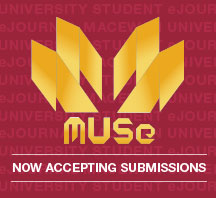The Patriation of Canada's Constitution by Pierre Trudeau
DOI:
https://doi.org/10.31542/muse.v6i1.2021Abstract
This article explores the events leading up to Constitution Act, 1982, in relation to the patriation of Canada's Constitution. Pierre Trudeau had been determined, ever since 1968, to remove the Canadian Constitution from Westminster and bring it home to Ottawa. It was viewed as a final step in the century-long journey towards Canadian independence from Britain. Shortly after coming to power, however, Trudeau found it increasingly difficult to alleviate the federal-provincial struggles that halted patriation. The failure of the Victoria Conference in 1971 eventually ceased any serious constitutional negotiations between Trudeau and the provinces for nearly a decade. However, the February 1980 victory that granted Trudeau a majority government renewed his confidence, and constitutional talks resumed. They culiminated in the Ottawa Conference held in November, 1981, which was successful in producing an agreement between 9 out of 10 provincial delegates and the federal government. Québec under René Lévesque was the only participant who declined to sign on to Canadian patriation after they had been exlcuded from a night of negotiations, known as the Night of Long Knives. So while Trudeau had achieved patriation, it was done at the cost of further alienating Québec. Ultimately, Trudeau pursued patriation to strengthen national unity. While this was successful to a degree, it failed with regard to Québec.
References
Downloads
Published
Issue
Section
License
Copyright (c) 2022 Isaac MacPherson

This work is licensed under a Creative Commons Attribution-NonCommercial 4.0 International License.
By publishing works in MUSe, authors and creators retain copyright under a Creative Commons Attribution NonCommercial (CC BY-NC) license, which allows others to share these works for non-commercial purposes as long as credit is given. The MUSe Editorial Board reserves the right to make copy-editing changes to works prior to publication to ensure they conform to the publication's style and quality standards. The Editorial Board also reserves the right to archive published submissions in MacEwan University's institutional repository, RO@M.



